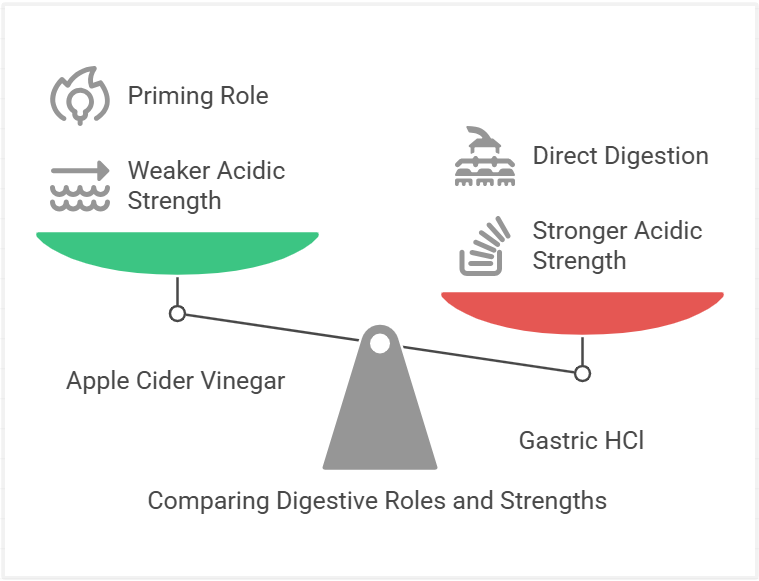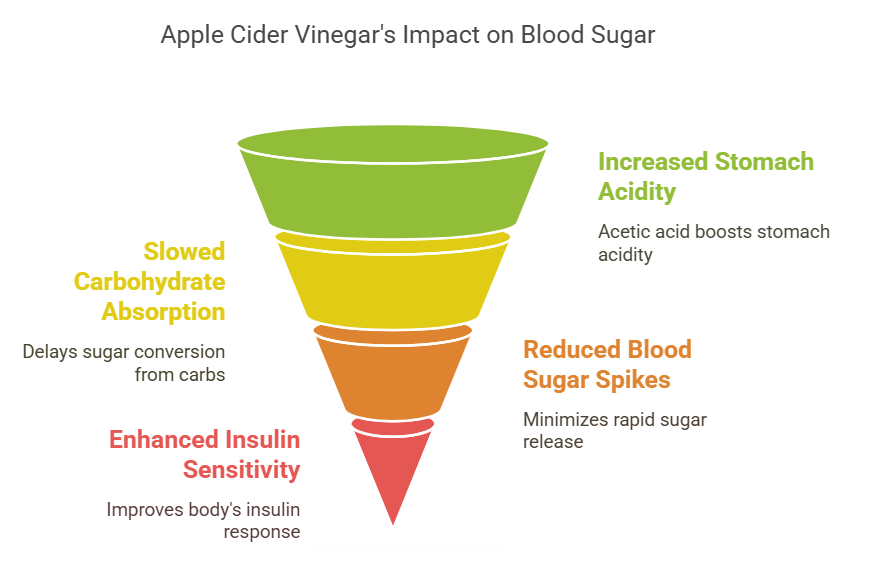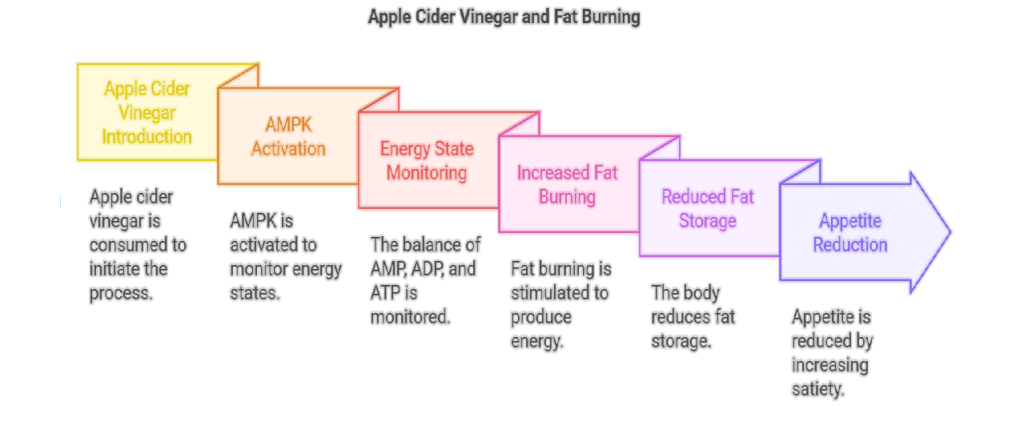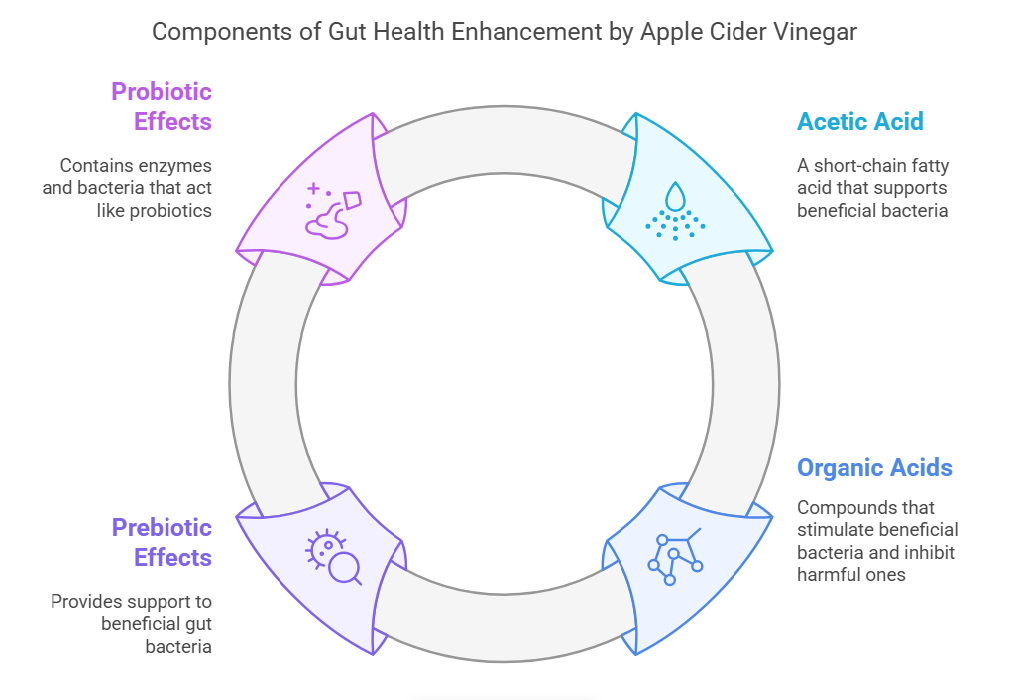Have you ever thought what would happen to your body if you drink apple cider vinegar (ACV) before bed? Sounds interesting, isn’t it? Well, the best time for drinking apple cider vinegar depends on the mechanism involved that would benefit you and that determines the timing. Let’s first understand what the different things are that apple cider vinegar can do for you. The following article discusses in detail the effects of drinking apple cider vinegar every day.
Apple cider vinegar helps in digestion

ACV helps in digestion and the reason behind it is that it’s an acid. However, it’s not as strong as gastric HCl. The pH of apple cider vinegar ranges between 2.5 and 3.5. On the other hand, stomach acid pH falls between 1 and 2. Since pH is an exponential scale, it means the acidic strength of gastric HCl is 30 to 100 times more than apple cider. So, even though acvhelps digestion tremendously, it doesn’t digest anything by itself. What it does, it primes the digestive tract. The apple cider vinegar triggers the parietal cells to make HCl. This results in the release of an enzyme, pepsin, responsible for predigesting proteins.
All these mechanisms take place in the stomach itself. This also triggers the gallbladder to release bile and the pancreas to release pancreatic enzymes in the small intestine. However, it is important to note that the first trigger started in the stomach itself and continues up to the small intestine. In other words, these mechanisms happen in a sequence and one thing leads to another. And apple cider vinegar can start off this process. Pancreatic enzymes such as proteases digest proteins further down into individual amino acids. The pancreas also releases lipases to break down fat and amylases to break down some carbohydrates.
Apple cider vinegar can be helpful in digestion because a lot of people have something called hypochlorhydria, meaning they do not make enough HCl by themselves. So, acv can help stimulate this process. People with hypochlorhydria often experience symptoms such as bloating, indigestion, malabsorption, acid reflux, and deficiencies of Fe, Ca, and Mg.
Apple Cider Vinegar Helps Blood Sugar Control

The active ingredient in the apple cider vinegar is acetic acid. And by improving the acidity in the stomach, you can slow down the absorption of carbohydrates and thus the rate at which they turn into sugar. Therefore, you are not going to get the blood sugar spikes the same way. People taking apple cider vinegar with a meal or before a meal could get up to 34% more insulin sensitivity, and the effects were greater in people with insulin resistance or type 2 diabetes, who already had some trouble with this.
Apple Cider Vinegar Helps Fat Burning

Apple cider vinegar can stimulate fat burning. The reason it does that: apple cider vinegar or acetic acid will increase the activity of AMPK (Adenosine Mono Phosphate kinase). It sounds a lot kind of like adenosine triphosphate. The reason is that they are kind of similar, as they are part of the same process. When adenosine is hooked up with a single phosphate, it makes AMP; if adenosine is hooked up with two phosphates, it forms ADP, and with three phosphates, ATP is formed — i.e., the energy currency of the body.
The more phosphates hooked up with adenosine, the more they act like a high-energy state. When you have ATP, you are fully loaded to take advantage of that energy.
Each phosphate breakdown from ATP results in the release of energy. Generally, there is a conversion between ADP and ATP, but in a really low energy state, it becomes AMP. So, this AMPK monitors the ratio between the very low energy state of AMP and the high energy state, called the ATP. If the AMP is relatively high, it means you need a lot more energy. You always have different amounts of AMP, ADP, and ATP, and the AMP kinase monitors these ratios.
And if you have a higher-than-normal amount of AMP and a lower-than-normal amount of ATP — that indicates the low energy state. And apple cider vinegar can shift this a little bit to get this process started to make energy a little bit easier, and thus it will tend to increase fat burning to make energy and reduce fat storage. And it can also help a little bit more — that apple cider vinegar will reduce appetite by increasing a satiety hormone called GLP-1 that makes you feel fuller.
Apple Cider Vinegar Helps Improve Gut Health

Apple cider vinegar helps improve gut health because the active ingredient in apple cider vinegar is acetic acid, and that’s actually a short-chain fatty acid that is produced by some gut bacteria but is also consumed by other gut bacteria. So, by taking some apple cider vinegar, you can also give these beneficial bacteria a little bit of a prebiotic to enhance their function.
Apple cider vinegar also contains some organic acids that can increase the function that can stimulate the beneficial bacteria and inhibit the harmful strains of bacteria. And, if you take an unfiltered apple cider vinegar – it contains a little bit of cloudiness at the bottom, and that’s what they call the mother, and also contains some enzymes and some bacteria that act like probiotics for these bacteria in the gut. So, there are many different ways that apple cider vinegar can actually support and improve the overall gut health.
What is the right time to take apple cider vinegar?
When to take it depends on what you’re trying to accomplish. It is, therefore, important to look at what your primary reasons would be out of the things discussed above.
Morning (Empty Stomach)
If you’re to take apple cider vinegar first thing in the morning on an empty stomach, it will do the following:
- Primes digestion for later
- Clears undigested residue
- Supports gut biome
- Kickstarts AMPK and fat burning
- Mild Systemic Effect (Detox)
15 minutes before Meals
If you take 15-20 minutes before the meal, it will do the following:
- Enhance digestion
- Increase food breakdown
- Increase nutrient absorption
- Reduces acid reflux
- Decrease blood sugar spikes
Before Bed
You can also take apple cider vinegar before bed. There are several benefits of it as mentioned below:
- Improve gut health
- Increase blood sugar control
- May improve sleep quality
It is important to note that if you’re taking apple cider vinegar at night, rinse your mouth immediately and wait for at least 30 minutes to brush.
Dosage of Apple Cider Vinegar
Does it change depending on when you take it? Well, a little bit. So, if you take it first thing in the morning on an empty stomach, you would typically take one tablespoon and that’s about 15 ml with 8-16 oz (2.5-5 dl) of water. On the other hand, if you take it before a meal, you would use the same amount if it’s a low carbohydrate meal because then you don’t really need so much of the blood sugar control.
If you consume food with a bit higher in carbohydrates then you would double the amount of the apple cider vinegar to get that extra boost to handle the glycemic response. So, if you double the amount, you also need to double the amount of water. Wait for at least 20-30 minutes before taking the meal.
If you take apple cider vinegar before bed, you would need to reduce the amount. Take one teaspoon with 5 to 15 ml of water. And if you’re prone to acid reflux, it would be better to take a little bit earlier than just before bed.
Flavor Tips
Some people love the flavor of apple cider vinegar, but many can’t stand it. So, here are some things that you can do to sort of work with the flavor. If that’s an issue for you, the first thing that you can do is dilute it. Dilute with at least 8oz of water per tablespoon of apple cider vinegar. Squeeze a bit of lemon and add a small amount of stevia. With that you can add sparkling water or an ice cube.
Risks of Too Much
Apple cider vinegar is good if it is taken as per the recommended amount. It is important to mention that adding more quantity does not mean, it would work much better. So, how much is too much and what are the risks involved? Well, you don’t typically need to exceed six tablespoons (approximately 90ml) a day. Some of the risks involved with taking too much apple cider are as follows:
- GI irritation
- Tooth enamel erosion
- Mineral loss (K) / Bone loss
- Salad vinegar counts too
Apple cider vinegar definitely helps in various ways for the human body. It not only helps in digestion and boosting gut health, but it also helps in controlling blood glucose. However, they say excess of everything is bad, and that is also true for apple cider vinegar. Taking the recommended dosage of it could definitely help in achieving overall health.



